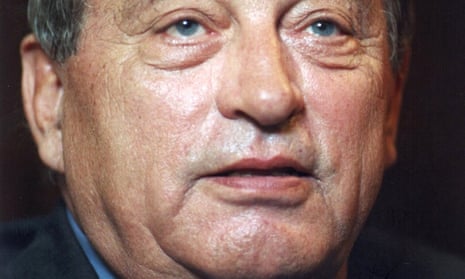Karl Otto Pöhl, who has died aged 85, was from 1980 to 1991 president of the Bundesbank, the (West) German federal or central bank, at a turbulent time that included German unification and preparations for the common currency of the European Union. He was previously a principal aide to Helmut Schmidt as state secretary – topmost civil servant – in the finance ministry and, after Schmidt lost the chancellorship in 1982, stayed on uneasily as bank president to work with his successor, Helmut Kohl.
Pöhl was an attractive public figure who appeared completely relaxed and at home at political meetings and press conferences, a trait which undoubtedly went back to his student days at Göttingen university studying economics, when he helped to support himself with sports reporting. Like his political mentor, Schmidt, he loved off-the-record chats with American and British journalists in his excellent English. He was also a great raconteur and gifted mimic.
These easygoing propensities sometimes got him into trouble. Addressing a European parliamentary committee in spring 1991 in English, in which he was less circumspect than in German, he declared that on unification in 1990-91 East Germany had been completely unprepared for monetary union with West Germany and the result was “a disaster”. There was some shock at his choice of word, and he tried to explain that he had been thinking in German while speaking English, and had the word Katastrophe in mind, which he asserted was not as strong. Most Anglo-German linguists would regard the two words as synonymous in both languages. It was a storm in a beer glass and a symptom of general economic anxiety.
But history has vindicated Pöhl’s assessment. The Kohl government allowed wildly over-generous exchange rates for personal savings between ostmarks and westmarks starting as high as one to one, whereas the hardnosed rate would have been seven to one. The decision proved well-nigh catastrophic, or indeed disastrous, for the economy of a united Germany in its early years. At a stroke, east German exports were priced out of their markets. Kohl was furious with the messenger, Pöhl.
Pöhl was born into a modest family in the central German city of Hanover, as the interwar Weimar republic began to succumb to world recession and the added pressure of war reparations, leading to political and economic crises that paved the way for Adolf Hitler and the Nazis, who came to power constitutionally in January 1933. Pöhl pursued a quasi-normal schooling before matriculating and going on to university.
Graduating in 1955, he worked for five years as a researcher at the Ifo Institute for Economic Research in Munich. Six years in Bonn as an economic journalist ensued. In 1966 Willy Brandt’s Social Democrats (SPD) won a share of power as junior partners with the Christian Democrats (CDU) in Germany’s first postwar grand coalition. By 1969, when the SPD took the lead in a coalition with the liberal FDP but without the CDU and Brandt became chancellor, Pöhl was a well-established member of the SPD. He entered the ministry of economics before transferring to finance as state secretary at Christmas 1972.
The SPD-FDP coalition easily won the premature general election of 1972, when the main issue was Ostpolitik, or postwar reconciliation with the Soviet Union and its Warsaw Pact allies, including a wary German Democratic Republic (East Germany). Brandt led a massively successful charm offensive, raising West Germany’s standing to a new height in west as well as east.
The post-election euphoria however began to crumble at home when Brandt lost his way as chancellor and the West German economic miracle of the 1950s and 60s began to stagnate. As finance minister, and two years later as chancellor, Schmidt, aided principally by Pöhl, struggled to control what was by contemporary German standards runaway inflation, of about six per cent. The spectre of German hyperinflation of the early 20s was never far away as a folk memory, artificially kept alive by political opponents. The FDP changed sides to the CDU over the budget and brought Schmidt down.
The problems were not confined to West Germany but affected the other members of what was then the European Economic Community (EEC). Schmidt and Pöhl were looking for and working towards European financial and monetary solutions, and did much of the groundwork on the role and constitution of the future European Central Bank, largely modelled on the Bundesbank and its guiding principles of price stability and independence from government, even though Pöhl fell out with Schmidt and Kohl in turn over the latter. Pöhl will go down in history as a father of the euro.
After retiring from the Bundesbank, Pöhl worked in the private banking sector and on the advisory boards of such companies as Royal Dutch Shell, Unilever, Rolls-Royce and Volkswagen. He spent his last years in that banker’s home-from-home, Zurich.
Pöhl’s first wife died in a car crash. He is survived by his second wife, Ulrike Pesch, whom he married in 1974, and by two sons and two daughters.

Comments (…)
Sign in or create your Guardian account to join the discussion